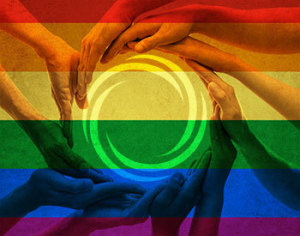A Culture of Inclusion at United Church Homes: Acceptance and the LGBT Community
 As America ages, so does its lesbian, gay, bisexual, and transgender (LGBT) community, creating both issues and opportunities for a generation of people who have lived relatively openly as themselves for 40-plus years.
As America ages, so does its lesbian, gay, bisexual, and transgender (LGBT) community, creating both issues and opportunities for a generation of people who have lived relatively openly as themselves for 40-plus years.
United Church Homes, a United Church of Christ-related ministry that serves over 4,000 residents in 69 communities in 14 states and two Native American nations, is committed to being an open and affirming organization, with an emphasis on creating a welcoming environment and ongoing efforts to be inclusive. For anyone who calls a UCH community home, we provide care for the whole person so that residents, staff, families, and friends can experience the peace that comes through safety and support.
The Rev. Dale Brown, chaplain at Trinity Community, is an openly gay man who came out in midlife. During UCH’s recent Centennial Celebration, he attended a presentation on “Aging and the LGBT Community” that was presented by Tim Johnston, PhD, assistant director of social enterprise and training of SAGE, the Services and Advocacy for Gay, Lesbian, Bisexual, and Transgender Elders. Dale discussed his decision to work for an open and affirming organization and the impact he sees it has on residents.
“I attended this session because I am always conscious of how to present myself, maintain relationships, and live an authentic, transparent professional existence,” he said. “When I joined United Church Homes a year and a half ago, the open and affirming stance was a primary factor in me coming to work here as a chaplain.
“I recognize that the liberties, openness, and many of the freedoms that I enjoy today are due to the advocacy and work of previous LGBT generations,” said Dale.
“I’ve seen many people who are looking into care communities make personal decisions to go back into the closet, or to conceal themselves and their relationships, for fear of how their caregivers will treat them. I grieve for these seniors. We all should be mindful that not every relationship is going to look exactly like ones we are accustomed to seeing.”
Dr. Johnston spoke on the importance of care with this vulnerable population and what can be done to increase acceptance and improve equality.
It is important to understand the stigma that was attached to identifying as an LGBT person in the 1940’s, 50’s, and 60’s. Until 1973, homosexuality was a diagnosable psychological disorder. “If someone was to discuss same-sex attractions with a mental health professional, it could then be grounds for having their children removed from the home, or cause them to lose their employment,” said Dr. Johnston.
“If you grew up this way, you often denied your self-identity. It became a matter of survival. To deny that identity becomes a habit, almost like muscle memory.”
Fast forward to today and someone who has lived an openly LGBT lifestyle may find that aging or aging services present a hostile, or at least inhospitable, environment. They may revert to a position of self-preservation and secrecy, unless a considerable amount of effort is made to communicate that they will be welcomed, accepted, and safe.
An inclusive environment not only provides safety for residents, but is considerate of their family members, as well. Everyone should feel comfortable visiting parents or grandparents in a community that welcomes LGBT individuals and their partners. United Church Homes has taken on an important leadership role in improving our performance in this area.
So what should we be doing to prepare for the next generation of seniors?
We work toward change right now. To enhance it and take it to the next level, UCH recognizes that we need to make our communities safe and accepting places for all people. It is a conscious, intentional decision — to be more adept at relating to this part of our population.
“We must be prepared for a cultural shift happening across the world of aging services. It is important that anyone working in aging services addresses the change immediately to be effective in providing care to older LGBT adults later,” said Dr. Johnston.
The Rev. Kenneth Daniel, president and CEO of United Church Homes, recently joined with other national organizations — including the United Church of Christ (UCC), SAGE, and the Council for Health and Human Service Ministries (CHHSM) — in signing a letter asking the Obama administration for greater leadership on issues facing LGBT seniors.
“We signed this advocacy letter because we believe that LGBT seniors are at risk in accessing care, services, and housing,” Daniel said. “Taking this position aligns with our vision, mission, and values, as well as our governance practice of engaging in advocacy for public policy at the state and national levels.”
It is with great care that we advocate for social justice and fair, ethical treatment of all people. We trust that UCH efforts in this area convey our willingness to speak out on this issue, and underscore our commitment to our core values of compassion, hospitality, respect, integrity, stewardship, and transparency.
For more on SAGE or issues related to LGBT and aging, please visit sageusa.org.
“We must be prepared for a cultural shift happening across the world of aging services. It is important that anyone working in aging services addresses the change immediately to be effective in providing care to older LGBT adults later.”
– Dr. Tim Johnston
Join Our Mailing LIst
"*" indicates required fields
Follow on Facebook
Pension Boards appoints David A. Klassen as its President, CEO - United Church of Christ
www.ucc.org
The Pension Boards, an affiliated ministry of the United Church of Christ recently announced its appointment of David A. Klassen as its next President and